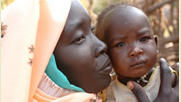CAFOD and Trocaire appeal for peace in South Sudan

On 15 December 2013, less than 30 months after the country won its independence, violence broke out when President Salva Kiir accused his former deputy, Riek Machar, of plotting a coup. In the fighting that followed, tens of thousands of people have died and roughly a fifth of the population has been displaced, leading to warnings of severe food crisis in certain areas.
A peace agreement reached this August has been very fragile, with areas still experiencing fighting, but the recent arrival in the capital, Juba, of opposition
representatives has created a glimmer of hope that a more sustainable peace settlement could be reached. At a meeting during the recent papal visit to African countries, Pope Francis is understood to have urged President Kiir, a Catholic, to support peace and reconciliation.
"I hope the message of Pope Francis gets through to everybody," said Francis Flood, the newly-appointed country representative in South Sudan for CAFOD and Trocaire. "It might lead to the creation of a peace space for all parties to show their capacity for the leadership that the people of South Sudan deserve."
Mr Flood, who previously spent two and a half years as an aid worker in the country, based in Western Equatoria State said a recent return visit had shown him how badly the security situation had deteriorated. Once peaceful, Western Equatoria has lately experienced an upsurge in violence. "The area is incredibly fertile," said Mr Flood. "With two harvests, in May and November, it can feed the whole region, but war will affect that, with huge humanitarian consequences."
Fighting has also forced CAFOD partners to suspend work in Melut and Upper Nile State, in the north of the country, but the charity continues to work elsewhere, and has launched a new project aiding displaced families in Yirol East, in Lakes State. "I am positive, because we are able to provide essential supports for people who are in desperate need, despite the turmoil," said Mr Flood. "There is no understating the need.
"When you include the independence struggle against Sudan, many people in South Sudan have never known anything but war. The conflict is incredibly complex. It is spurious to assume that it is exclusively tribal - there are scores of tribes in South Sudan. It is all about people putting aside their differences and finding common ground on behalf of all of the people of South Sudan."
"Despite the efforts of neighbouring countries and the international community, the solution must come from South Sudan's people themselves. It has to be inclusive, and not just involve a relatively small number of tribes, as has happened in the past."
CAFOD and its partners in the international Caritas network had continued working in South Sudan when many other aid agencies had pulled out, said the new country representative, who will be based in Juba from mid-January. "The key point of the CAFOD approach is that we work through local partners," he added. "We are not about to impose our views. It is a very special way of working, and we are there to stay."
From 1 April 2015 CAFOD and Trócaire started working in together in South Sudan, as CAFOD and Trócaire in Partnership.
See: CAFOD www.cafod.org.uk/ and Trócaire www.trocaire.org/


















